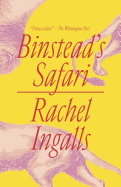
Binstead's Safari by Rachel Ingalls (Mrs. Caliban) introduces Millie, the neglected wife of an academic who blames her for being uninteresting. She insists on joining him on a research trip to Africa, and unexpectedly blossoms during the journey to safari camp. People are drawn to her, and her sexuality is evident to one particular man. Her husband is shocked to see her become the center of attention, and as her confidence grows, her willingness to live in the shadows disappears. Millie realizes "life was too short to waste time trying to find excuses for not doing the things you really wanted to do."
In the mid to late 20th century, when the story takes place, it was typical for a woman's worth to be measured as wife and mother. Millie's sister says, "All the things I have... how good they'd be if only I'd had any choice in the matter." The attitude toward Africa and its citizens was similarly paternalistic. Animals were killed during safaris to display man's natural superiority, and native Africans were considered a backdrop to white privilege. Binstead's Safari displays all of these assumptions, yet readers shouldn't dismiss it as outdated. Not only does the novel tackle gender issues that were emerging then and are still relevant decades later, but surprises the reader with a dark turn of events that brings the novel to an unsettling conclusion. This new edition encourages contemporary readers to consider how gender roles have changed--or not--since its initial 1983 publication. --Cindy Pauldine, bookseller, the river's end bookstore, Oswego, N.Y.

